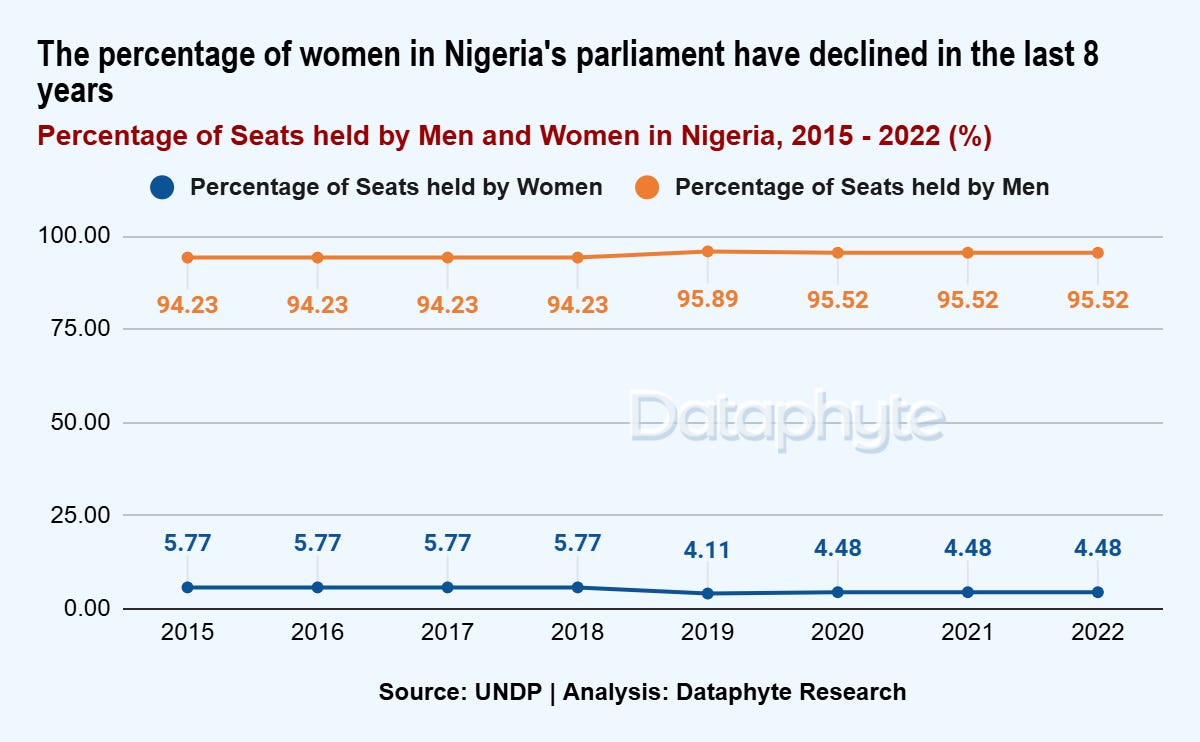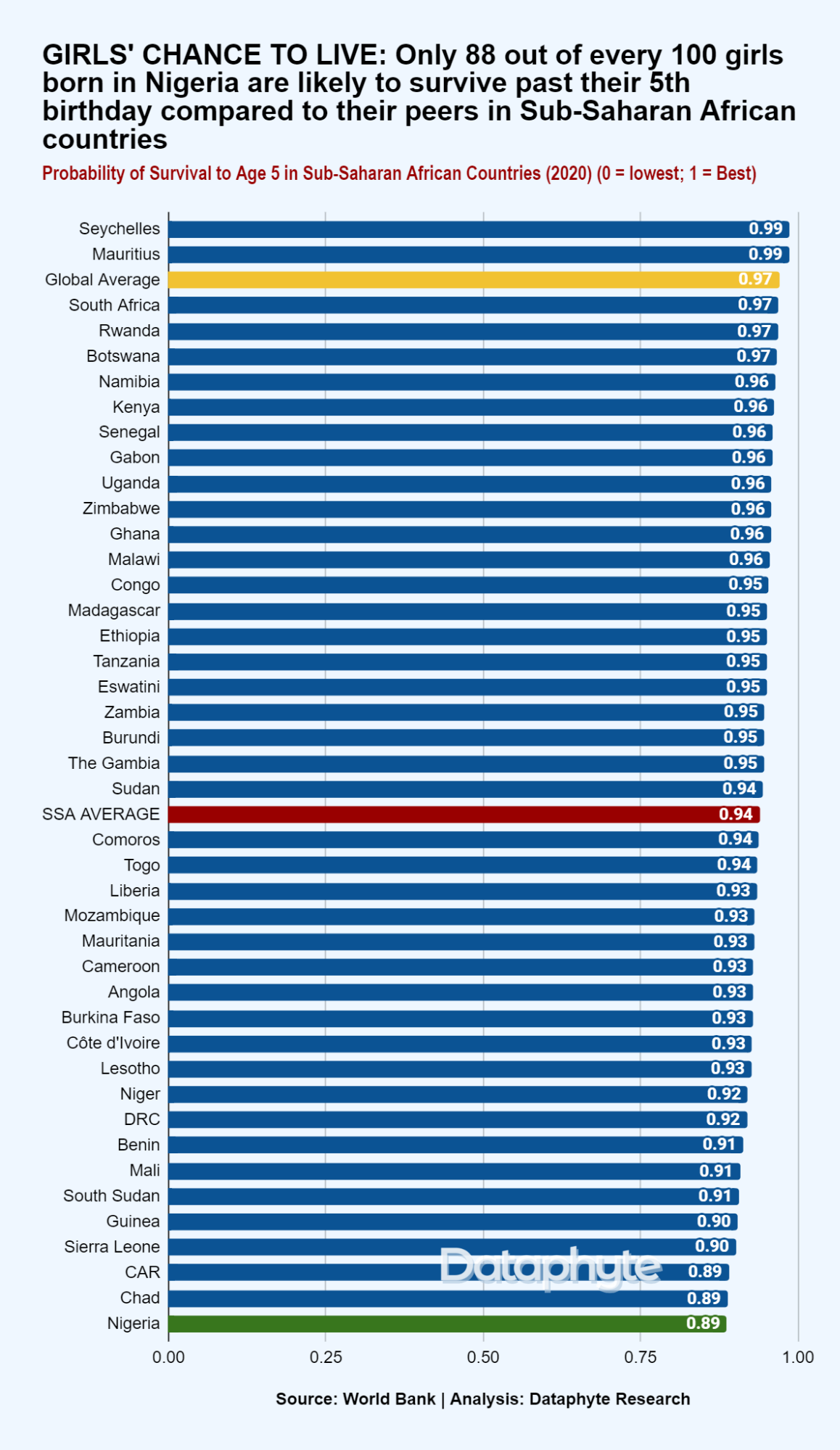In the past few weeks, Nigeria witnessed significant political developments that have raised concerns about gender equity. The 6 months suspension of Senator Natacha from the House of Assembly, alongside Senator Mojisola's sudden resignation as the first female speaker of the Lagos House of Representatives just two weeks after she assumed office casts a shadow over the progress made in advocating for women's representation and leadership in politics. These events appear to mark a troubling setback in the ongoing struggle for gender equality in the nation.
This year’s theme for the International Women’s Day celebration, “Accelerating Growth” when peering with the past week's events, shows that Nigeria still has a long way to go in ensuring gender equity.
Has Nigeria Made Progress in the Last Four Years?
Yes, but slow. The Global Gender Gap Index shows that Nigeria has moved from 139th place out of 156 countries in 2021 to 125th place out of 146 countries in 2024.
However, given the decline in the number of countries represented in the 2024 edition compared to 2021, Nigeria's actual movement in the rankings is relatively minimal. Over the past four years, Nigeria has improved by only four places.
Also, Nigeria’s score, which has remained in the 0.60 range, increased marginally by just 0.02 points from 0.63 in 2021 to 0.65 in 2024.
These signify that the advancements in areas such as economic participation, educational attainment, health, and political empowerment for women have been quite slow.
While the figure is above the 0.50 average, a ranking of 125th still highlights the need for significant improvement compared to other nations.
The ranking on gender gap parity, uses parameters like economic participation and opportunity, educational attainment, health and survival, political appointment, and financial exclusion/wealth accumulation of the female gender in the world to gauge the level of gender parity within the period.
On a continental level, Sub-Saharan Africa has demonstrated notable progress in gender parity, with 21 out of 35 countries ranking among the top 100 globally.
Among these, Namibia stands out as a regional leader, securing the 8th position worldwide with an impressive gender parity score of 80.5%.
South Africa follows closely, ranking 18th, which reflects its strides in women's political representation, economic participation, and educational attainment. Mozambique, positioned at 27th, has also made significant advancements, particularly in women's workforce inclusion and access to education.
Meanwhile, Burundi and Rwanda, ranked 38th and 39th, have been recognised for their policies promoting women's participation in leadership, government, and business.
Nigeria, however, ranks 29th out of 34 African countries ranked in the report. This indicates that Nigerian women are still behind their peers in Africa.
Nigeria's Performance in Key Areas
An analysis of the parameters used in measuring gender parity shows that women in Nigeria have had a measure of success in some measurement areas such as economic participation and opportunity, health and survival, but have struggled in educational attainment and political empowerment.
Women Education
Regarding educational attainment, Nigeria fell from 137th in 2023 to 138th in 2024. However, its score improved marginally by 0.01 points, from 0.83 in 2023 to 0.84 in 2024.
This slight improvement may result from an increase in the quantity of education a female child receives. In 2018, female children in Nigeria received an average of 7.6 years of schooling, which increased to 10 years by 2020.
On the other hand, the gap in adult literacy between males and females is larger compared to the gap in the sub-Saharan average and the average of other lower-middle-income countries.
This gap in educational attainment between men and women will fuel a deeper gender inequality, reducing the chances for women to have greater opportunities and reach their full potential.
Political Empowerment
Political leadership in Nigeria remains male-dominated, as reflected in Nigeria's low score in the World Economic Forum's gender gap ranking. However, Nigeria's political empowerment score increased from 0.04 (4%) in 2021 to 0.1 (10%) in 2024, improving its ranking from 149th to 136th.
Despite this improvement, the number of seats held by women in Nigeria's parliament has decreased over the last eight years, indicating that true progress in political representation remains slow and inconsistent.
Economic Participation and Opportunities
Women in Nigeria now have more opportunities in business and economic activities as indicated in the gender gap report. The country moved from 78th position in 2021 to 49th in 2024 in economic participation and opportunity.
Although Nigerian women actively participate in the labour force, their involvement has declined. As of 2023, 52 out of 100 women were part of the active labour force, down from 56 out of 100 in 2014.
Despite this decline, the participation of women in Nigeria’s labour force remains above the global average.
A World Bank report on Gender Equality in the Nigerian Private Sector indicates female management positions in Nigeria are higher than the global average. Nigerian women hold nearly three times the global average for Board Chair positions (17% in Nigeria compared to 6% globally).
Additionally, 57% of managerial positions in Nigeria are held by women, compared to the global average of 28%.
While progress has been made, more opportunities are needed for women to reach their full economic potential. Many women still lack the training and resources required to succeed.
Health and survival
The health of Nigerian women is influenced by socioeconomic factors, medical regulations, and cultural norms. Women face challenges such as high maternal mortality rates and restricted access to quality healthcare.
Pregnancy and postnatal complications remain the leading causes of death among Nigerian women of childbearing age.
With approximately 82,000 maternal deaths recorded in 2020, Nigeria has the highest absolute number of maternal deaths worldwide. It ranks third in maternal mortality per 100,000 births, behind South Sudan and Chad.
According to World Bank data, only 88 out of every 100 girls born in Nigeria survive past their fifth birthday, compared to an average of 94 out of 100 in Sub-Saharan Africa. The health environment experienced during prenatal, infancy, and early childhood significantly influences survival rates.
Gender equality has been linked to improved development outcomes, including increased GDP, enhanced productivity, and accelerated economic growth.
Both equal outcomes (such as labour force participation, employment, entrepreneurship, and political representation) and equal opportunities (including legal rights, access to education, healthcare, and financial resources) are crucial for achieving sustainable development.
Do you work at a Civil Society Organisation? Share your insights on Digital Public Infrastructure (DPI) and e-governance platforms in Nigeria. Take our 5-minute survey:
Do you work for any government agency? Share your insights on Digital Public Infrastructure (DPI) and e-governance platforms in Nigeria. Take our 5-minute survey:











